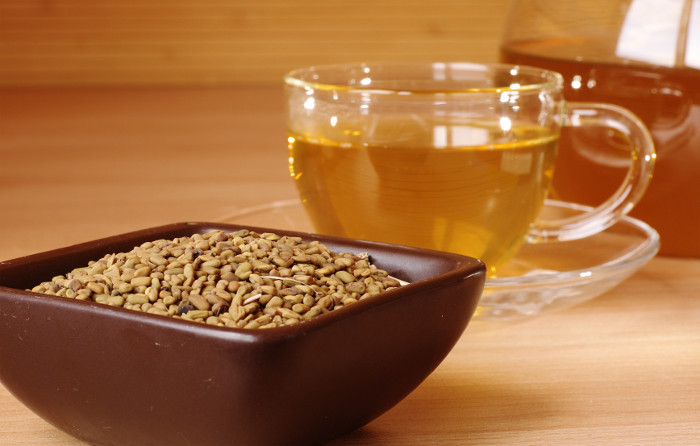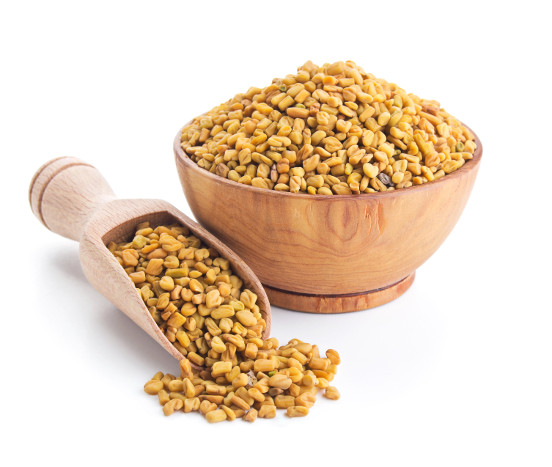Fenugreek Tea: Benefits, Side Effects, Uses

Hailing from semiarid climates across the globe, fenugreek tea offers a rich flavorful taste and a very distinct sweet aroma. Various parts of the plant are used in Indian, Turkish and Egyptian cuisine, while the seeds of the fenugreek plant are used to make medicine such as steroids from the component diosgenin. The leaves of the plant can also be used to create an herbal tea that’s packed with essential vitamins and minerals.
What Benefits Does Fenugreek Tea Offer?
The benefits of using fenugreek are many, as the first recorded use of the plant dates to 1500 B.C. from an ancient Egyptian papyrus, as noted by the National Institutes of Health. From a historical standpoint, fenugreek was a recipe for good health, often used for digestive issues, to induce labor and control symptoms associated with menopause. Modern uses of fenugreek include:
- Controlling diabetes (Early research shows that consuming fenugreek during a meal helps lower blood sugar, according to WebMD).
- Stimulating one’s appetite
- Increasing or stimulating milk production among breastfeeding women
- To mask the taste of medications
- Heartburn, high cholesterol and weight loss
- Hardening of the arteries
- Fever, constipation and weight loss
Are There Any Side Effects?
As with any herbal remedy or supplement, including fenugreek tea, some side effects are possible, although typically minor. While fenugreek tea is safe for most people, some possible side effects include Side effects include stomach related issues such as stomach upset, bloating, diarrhea, flatulence and urine with a slight odor of “maple syrup.”
Individuals who are sensitive to fenugreek can experience nasal congestion, coughing, wheezing, facial swelling, and a severe allergic reaction in rare cases. As fenugreek is used to lower blood sugar, people with diabetes should be cautious when using the herb and begin with small amounts to accurately gage the side effects. Furthermore, fenugreek interacts with antidiabetes medications and may slow blood clotting.
Additionally, while fenugreek tea is used to stimulate lactation among breastfeeding women and is likely safe, current scientific research on safety and long-term effects on infants is lacking. WebMD states, ” fenugreek tea has been linked to a loss of consciousness in some children…as well as a “maple syrup-like” body odor.”

How To Make Fenugreek Tea
Making fenugreek tea is a fairly straightforward and fun process. There’s no need for fancy equipment or a great deal of know-how. Feel free to play with the recipe and add additional favorite loose leaf herbs.
Recipe
- Add 1 teaspoon of fenugreek seeds for each cup of tea
- 1 cup of water for every teaspoon of fenugreek seeds
- Additional herbs or loose leaf teas to taste
First, crush the fenugreek seeds fairly well. Traditionally, a mortar and pestle were commonly used but any crushing tool will suffice. Some people simply use the flat blade of a large knife on a cutting board. Next, measure the correct amount of crushed seeds. Boil the appropriate amount of water in a kettle. When the water is boiling, simply add the seeds and allow them to steep for a minimum of four minutes. When adding the seeds, add additional loose leaf herbs to taste, although this isn’t necessary, as fenugreek tea is delicious without any additives. When the seeds have steeped, simply pour the rich liquid through a strainer and enjoy.
Where to Buy Fenugreek Seeds or Tea
While fenugreek is a mainstay in many cultures, it is fairly new to the West. First, look for premade teas at local health food stores. If this proves fruitless, seek out markets that specialize in Indian, Egyptian, Asian and Turkish cuisine. Most often, fenugreek seeds are found in the spice or tea section. A search online should also yield positive results. Simply look for organic whole fenugreek seeds, as crushing changes the chemical makeup of the seeds and reduces the benefits of consuming the tea.
Fenugreek tea is a healthy herbal addition to most diets, containing antioxidants to fight free radicals and amino acids that control insulin production when blood sugar levels are high. Some studies show that fenugreek can even help protect the body against colon cancer and be used as a soothing poultice for aching muscles. Overall, the benefits of having a daily cup of fenugreek tea are many.
